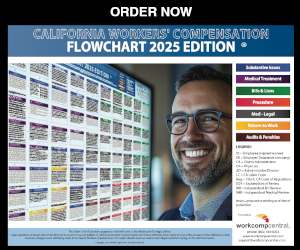Industry Insights
September 21, 2017
O'Gorman: Worker Needs to Show More Than Simply Being at Work to Get Benefits
- State: Illinois
- - 0 shares
Herff Jones v. Illinois Workers’ Compensation Commission, 2017 IL App (4th) 160346WC-U again confirms that the Illinois courts have rejected the use of the “positional risk” doctrine in the state workers' compensation system.

Timothy O'Gorman
The claimant in Herff Jones alleged that WC benefits were owed for a right hand injury as a result of an alleged fall while at work. She testified initially that she believed her fall was caused by a rock she stepped on while taking a break and going on a walk on a normal city street with a co-worker.
The claimant, however, mentioned the probability of being too close to the edge of the sidewalk. She admitted she could not recall seeing a rock and provided a prior recorded statement denying she saw any defects in the sidewalk or the walkway.
The respondent’s human resources manager testified that he spoke to the claimant after the incident where she stated she was not sure what happened. The respondent’s HR manager inspected the area where the claimant fell and did not see any rocks, and could not identify any defects in the sidewalk or the surrounding environs.
The HR manager also testified that he took photographs of the area in question. The photographs were described as “lost forever,” save for one, which was not provided at the time of hearing. Instead, photographs taken at an unknown date and unknown time were presented as evidence. It is odd to note that the photos were admitted without objection.
The arbitrator rendered a decision, finding the claimant’s alleged injury did not arise out of or in the course of the claimant’s employment. On review, the Workers' Compensation Commission affirmed unanimously.
On appeal to the Circuit Court, the court reversed the commission’s decision, stating:
"There are disputed facts; namely what caused the fall, [and] [t]his allows the court to consider this a question of law."
The ruling goes on to state:
"In this case, it is clear to this court that whether or not the [claimant] employee tripped on a rock is immaterial. The fact is that she was on an official break during her employment and remained on the [employer’s] premises. Thus, her accident arose out of and was in the course of her employment."
The WC Appellate Court’s decision on this statement speaks for itself:
"The Circuit Court was correct in stating that the cause of the claimant's fall was a disputed question of fact. But that did not justify the circuit court considering the issue 'as a question of law.' It is the commission that resolves disputed issues of fact (O'Dette v. Industrial Comm'n, 79 Ill. 2d 249, 253 (1980)), not courts on review of its decisions. The commission's resolution of a factual issue will not be disturbed on review unless it is against the manifest weight of the evidence. Orsini v. Industrial Comm'n, 117 Ill. 2d 38, 44 (1987). Compounding the error was the circuit court's conclusion that, simply because the claimant was on a scheduled work break and on Herff's premises when she fell, her injury arose out of her employment and 'automatic liability applies.' The circuit court seems to have adopted positional risk whenever an employee is on the employer's premises and engaging in activities of personal comfort. The positional risk doctrine has been rejected in this state as being inconsistent with the requirements of the act, and specifically the requirement that to be compensable, an employee's injury must arise out of her employment. Brady v. Louis Ruffolo & Sons Construction Co., 143 Ill. 2d 542, 552 (1991). Herff Jones v. IWCC, at pg. 8 para 17.
In disagreeing with the Circuit Court’s seeming application of the “positional risk” doctrine, the WC Appellate Court found:
- Claimant’s alleged injury was not a result of a personal risk.
- Claimant’s alleged injury occurring while walking across a sidewalk did not establish a risk greater than that faced by the general public.
- Claimant’s alleged injury was not a risk incidental to her employment.
The Appellate Court examined the third potential risk in greatest detail. The claimant was not carrying anything in furtherance of her employment with the respondent. The claimant was not traveling from one place to another in furtherance of her employment with the respondent.
Based on the claimant’s testimony, she was unable to establish that a defect occurring on the respondent’s premises was the cause of her alleged accident. As such, the Appellate Court vacated the decision of the Circuit Court and affirmed the decision of the commission denying any and all benefits.
We salute the court for following the traditional precepts of Illinois WC law and practice.
Timothy O’Gorman is an attorney at Keefe, Campbell, Biery and Associates, a Chicago-based workers' compensation defense firm. This column was reprinted with permission from the firm's client newsletter.
Advertisements
Columns
- CAAA: Audit Exposes Deep Failures at Cal/OSHA 07/30/25
- Paduda: Work Comp Remains the Darling of P&C Industry 07/28/25
- Wroten: The Flip Side of Regulations 07/25/25
- Moore: Were We Right About Comp in 2022? 07/23/25
- Kamin: WCIRB Says Carriers Losing Money Due to Rising Costs 07/21/25
- Paduda: What's Happening in Golden State Work Comp? 07/18/25
- CAAA: Fireworks Warehouse Blast Exposes Flaws in Safety, Oversight, Accountability 07/16/25
- Gelman: Asbestos Ban Is a Win for Workers 07/14/25
- Snyder: Mediation Confidentiality 07/11/25
- Snyder: Settle and Sue: Don't Let It Happen to You 07/09/25
- Kamin: State Senate Committee to Consider SIBTF Bill 07/07/25
- Anders: Self vs. Professional MSA Administration: Which Is Right for the Injured Worker? 06/30/25
- Geaney: Court Affirms Finding of Police Officer's Joint Employment 06/27/25
- Fricker: A New Era for Comp Subrogation 06/25/25
- Kamin: AI for HR Equals Bad Injury Reporting 06/20/25
- Montgomery: Will DWC Ignore New Law? 06/18/25
- Kamin: 4th DCA Clarifies DOI From Date of Knowledge 06/16/25
- Wade: Are the Old Ways Gone? 06/13/25
- Snyder: Trust Your Intuition 06/12/25
- Montgomery: DIR Director Reportedly Resigning 06/11/25
Now Trending
- Workers' Compensation News
-
Calif. Appeals
Court Upholds $1M Jury Award in
Wrongful Death…
Posted on Jul 30, 2025
-
Calif. WCIRB
Releases State of System…
Posted on Jul 28, 2025
-
Calif. Company
Settles Allegations of
Misclassifying Franchisees as…
Posted on Jul 29, 2025Richard Harrington says: “Like an independent contractor, wouldn't a franchisee also be responsible for setting…”
-
Calif. Auditor:
Understaffing, Process Deficiencies
Hamper Enforcement of Worksite…
Posted on Jul 31, 2025
-
Calif. WCIRB
Announces 2025 X-Mod…
Posted on Jul 29, 2025
-
Texas Court Cites
Ruttiger in Vacating $750,000 Jury
Award for Bad Faith…
Posted on Jul 28, 2025
-
Mont. Carrier's
Belated Payment of Settlement
Doesn't Warrant…
Posted on Jul 29, 2025
-
Neb. Worker Gets
Award for Foot Injury, but Not for
Anxiety,…
Posted on Jul 31, 2025
-
Neb. Federal Court
Rejects Widow's Challenge to
Compelled…
Posted on Jul 29, 2025
-
Pa. Worker Not
Entitled to Additional Benefits for
Alleged Fall-Related…
Posted on Jul 29, 2025
Jobs
Upcoming Events
Aug 26, 2025
Claims Association of Greater
Join the Claims Association of Greater Chicago (CAGC) for a day of golf, networking, and fun at Th …
Sep 2-4, 2025
San Diego Elevate Workers' Com
We are thrilled to announce that Early Bird registration is OPEN for ELEVATE® 2025! This year's …
Nov 7, 2025
WIMAH 2025 Workers’ Compensati
Join Hawai'i’s premier workers’ comp event for expert insights, top-tier networking, and standout …
Social Media Links
c/o Business Insurance Holdings, Inc.
Greenwich, CT 06836




No Comments
Log in to post a comment